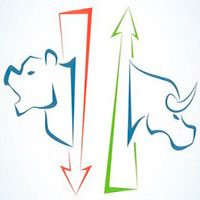There are several external factors that affect Forex currency trading. These factors include trade reports, GDP, unemployment, international trade, manufacturing etc. The growth or decline in these factors affects a country’s currency value. Foreign exchange is a continuous global market, providing a 24-hour market access to its players. Since it is open only 5 days a week, so weekend is the closing period. Although foreign exchange is the most liquid of all markets, the fact that it is an international market and trading 24-hours a day, the time of day can have a direct impact on the liquidity available for trading a particular currency.
The major centers and time zones are that of Sydney, Tokyo, London, and New York. Therefore, forex alerts must consider which players are in the market, since in the modern interconnected financial world, events that occur at any hour, in any part of the globe, can affect some or all parts of the investment community.
In forex trading, you are not ignorant like one remains in stock for a considerable period of time about the news affecting the liquidity of a stock. Foreign Exchange rate is one of the most important means through which a country’s relative level of economic health is determined. A country’s foreign exchange rate provides a window to its economic stability, which is why it is constantly watched and analyzed. If you are thinking of sending or receiving money from overseas, you need to keep a keen eye on the currency exchange rates.
The exchange rate is defined as “the rate at which one country’s currency may be converted into another.” It may fluctuate daily with the changing market forces of supply and demand of currencies from one country to another. For these reasons; when sending or receiving money internationally, it is important to understand what determines exchange rates. Currency values are in constant flux, regularly going up and down in value. Five years ago, $1AUD was worth $0.90 USD. At time of writing it’s worth $0.66 USD. However, this isn’t entirely random and there are factors that affect its performance. In this post we examine key factors that influence currency value.
Inflation levels and trends
The inflation rate of a country can have a significant impact on the value of its currency and, consequently, on the exchange rates of other nations. Generally, a country with an inflation rate lower than that of its trading partners’ will lead to the appreciation of its currency thanks to the increase in purchasing power that this entails and vice versa.
For example, if the inflation rate in the eurozone were relatively lower than in the United States, exports in the former would become more competitive than in the latter, which would increase the demand for euros to buy goods in euro countries. The higher the demand for a currency the greater its appreciation.
A currency usually strengthen when inflation rises because of expectations that the central bank will raise short-term interest rates to combat rising inflation.
Government budget deficits/surpluses
This is the difference between what the government takes in and what it pays out in terms of spending in the economy. A budget deficit is seen as being negative for a currency (as the Government would be expected to print more money to balance the books causing depreciation in the value of the currency) A country’s current account reflects balance of trade and earnings on foreign investment. It consists of total number of transactions including its exports, imports, debt, etc. A deficit in current account due to spending more of its currency on importing products than it is earning through sale of exports causes depreciation. Balance of payments fluctuates exchange rate of its domestic currency.
Balance of trade levels and trends
A country will account for the demand for goods and services with other countries through its balance of trade. If a country is a ‘net-importer’ then it will be importing more goods and services from a country then it is exporting. Thus it will then be acquiring more of the target country’s currency to settle trading balances.
Related to current accounts and balance of payments, the terms of trade is the ratio of export prices to import prices. A country’s terms of trade improves if its exports prices rise at a greater rate than its imports prices. This results in higher revenue, which causes a higher demand for the country’s currency and an increase in its currency’s value. This results in an appreciation of exchange rate.
The trade-weighted effective exchange rate index (TWI), a common form of the effective exchange rate index, is a multilateral exchange rate index. It is compiled as a weighted average of exchange rates of home versus foreign currencies, with the weight for each foreign country equal to its share in trade. When exports outweigh imports, an economy is said to have a ‘trade surplus’, strengthening the stability of said economy. The currency value rises as foreign consumers buy the currency to purchase exported goods.
On the other hand, when imports are greater than exports, an economy experiences a ‘trade deficit’. The country must sell its own currency to purchase the imported goods, leading to a reduction in currency value.
Interest rates
Changes in interest rate affect currency value and dollar exchange rate. Forex rates, interest rates, and inflation are all correlated. Increases in interest rates cause a country’s currency to appreciate because higher interest rates provide higher rates to lenders, thereby attracting more foreign capital, which causes a rise in exchange rates.
If interest rates are increased, holding that nation’s currency generates higher interest payments, creating more opportunities for profit growth. This draws in traders who try to buy it up, increasing the price of the currency.
Conversely, if the rates are decreased, opportunities for profit decrease and the currency is considered less valuable, causing people to try sell it off. With falling demands, the currency’s price falls. This is always a major focus in the forex market. Since the central banks mandate monetary policy and supply, they are the prime focus of investors and the various market participants.
Macroeconomic and Geopolitical Events
Elections, financial crises, monetary policy changes, and wars can influence the biggest changes in the Forex market. These events can either change and/or lead to reshaping of a country’s economy. Political upheaval in the economy is a reason for the currency to be sold off. In G7 currencies, this does not happen often as the governments are viewed as stable, but it is different for the emerging market currencies (e.g. Argentina and Turkey in 2018)
The political landscape plays a vital role in the overall outlook for a country and, consequently, the perceived value of its currency. Forex traders are constantly monitoring political news and events to anticipate changes in the economic policies of national governments. These can include shifts in government spending and adjustments in regulations imposed on particular sectors or industries. Changes in rules regarding margin or leverage available to traders often have a dramatic impact on markets.
The fiscal and monetary policies of any government are the most critical factors in its economic decision making. Central bank decisions that impact interest rates are keenly watched by the forex market for any changes in key rates or the future outlook of policymakers.
Conclusion
The forex market is ultimately driven by economic factors that impact the value and strength of a nation’s currency. The economic outlook for a country has the most influence on the value of its currency. Knowing the factors and indicators to watch will help you keep pace in the competitive and fast-moving world of forex.

















